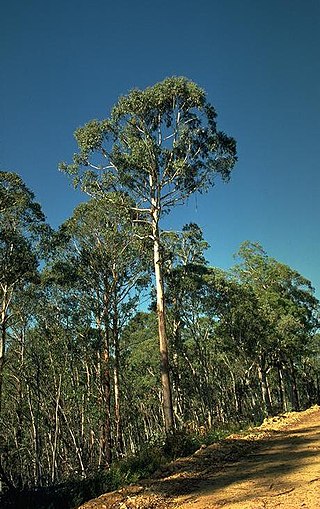
Eucalyptus delegatensis, commonly known as alpine ash, gum-topped stringybark, white-top and in Victoria as woollybutt, is a species of tree that is endemic to southeastern Australia. It has a straight trunk with rough, fibrous to stringy bark on the lower half of the trunk, smooth white bark above, lance-shaped to curved adult leaves, flower buds in groups of between seven and fifteen, white flowers and barrel-shaped or hemispherical fruit.

Eucalyptus pauciflora, commonly known as snow gum, cabbage gum or white sally, is a species of tree or mallee that is native to eastern Australia. It has smooth bark, lance-shaped to elliptical leaves, flower buds in clusters of between seven and fifteen, white flowers and cup-shaped, conical or hemispherical fruit. It is widespread and locally common in woodland in cold sites above 700 m (2,300 ft) altitude.
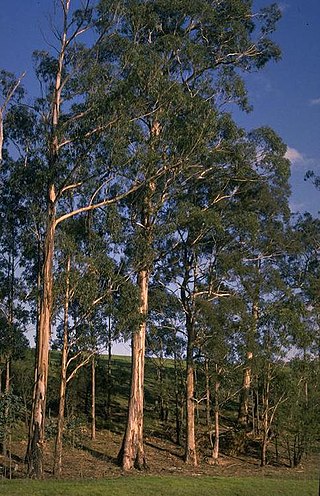
Eucalyptus globulus, commonly known as southern blue gum or blue gum, is a species of flowering plant in the family Myrtaceae. It is a tall, evergreen tree endemic to southeastern Australia. This Eucalyptus species has mostly smooth bark, juvenile leaves that are whitish and waxy on the lower surface, glossy green, lance-shaped adult leaves, glaucous, ribbed flower buds arranged singly or in groups of three or seven in leaf axils, white flowers and woody fruit.
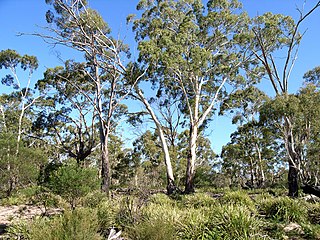
Eucalyptus viminalis, commonly known as the manna gum, white gum or ribbon gum, is a species of small to very tall tree that is endemic to south-eastern Australia. It has smooth bark, sometimes with rough bark near the base, lance-shaped to curved adult leaves, flower buds in groups of three or seven, white flowers and cup-shaped or hemispherical fruit.

Eucalyptus gunnii, commonly known as cider gum, is a species of large tree in the flowering plant family Myrtaceae. It is endemic to the island of Tasmania, Australia. It has mostly smooth bark, lance-shaped to egg-shaped adult leaves, flower buds in groups of three, white flowers and cylindrical to barrel-shaped fruit.
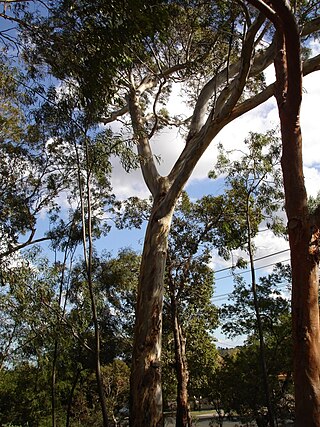
Eucalyptus leucoxylon, commonly known as yellow gum, blue gum or white ironbark, is a species of small to medium-sized tree that is endemic to south-eastern continental Australia. It has smooth yellowish bark with some rough bark near the base, lance-shaped or curved adult leaves, flower buds in groups of three and cylindrical, barrel-shaped or shortened spherical fruit. A widely cultivated species, it has white, red or pink flowers.

Eucalyptus goniocalyx, commonly known as long-leaved box, olive-barked box or bundy, is a species of small to medium-sized tree that is endemic to southeastern Australia. It has rough, fibrous or flaky bark, lance-shaped to curved adult leaves, flower buds in groups of seven, white flowers and cup-shaped, cylindrical or barrel-shaped fruit.
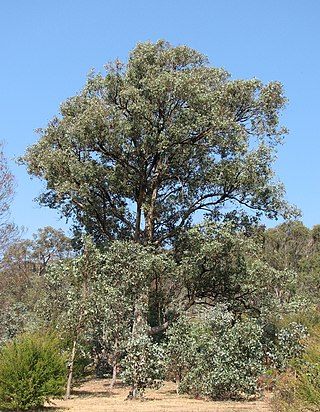
Eucalyptus polyanthemos, commonly known as red box, is a species of small to medium-sized tree, that is native to eastern Australia but has been introduced into other countries. It has fibrous bark on the trunk and larger branches, smooth greyish to cream-coloured bark above, or smooth bark throughout. It has broadly egg-shaped to round juvenile leaves, lance-shaped, egg-shaped or almost round adult leaves, flower buds in groups of seven, white flowers and barrel-shaped to conical fruit.

Eucalyptus rubida, commonly known as candlebark, ribbon gum or white gum, is a species of small to medium-sized tree that is endemic to south-eastern Australia. It has smooth bark, sometimes with rough bark at the base, lance-shaped or curved adult leaves, flower buds in groups of three, white flowers and cup-shaped, hemispherical or bell-shaped fruit.

Eucalyptus globulus subsp. bicostata, commonly known as the southern blue gum, eurabbie, blue gum or Victorian blue gum, is a subspecies of tree that is endemic to south-eastern Australia. It has mostly smooth bark with some persistent slabs of old bark at the base, juvenile leaves with one glaucous side, glossy, lance-shaped adult leaves, warty flower buds in groups of three, white flowers and hemispherical to conical fruit.

Eucalyptus globulus subsp. maidenii, commonly known as Maiden's gum, is a subspecies of tree that is endemic to southeastern Australia. It has mostly smooth bark with some persistent slabs of old bark at the base, juvenile leaves with one glaucous side, lance-shaped adult leaves, flower buds arranged in groups of seven, white flowers and conical, pedicellate, sometimes glaucous fruit that is more or less square in cross-section

Eucalyptus camphora, commonly known as swamp gum is a flowering plant that is endemic to south-eastern Australia. It is a species of small to medium-sized tree with smooth bark, sometimes rough at the base, broadly lance-shaped to egg-shaped or elliptic adult leaves, flower buds in groups of seven, white flowers and conical fruit. There are two subspecies, subspecies camphora, commonly known as broad-leaved sally or swamp gum and subspecies humeana, commonly known as mountain swamp gum.

Eucalyptus parramattensis, commonly known as the Parramatta red gum or drooping red gum, is a species of small to medium-sized tree that is endemic to eastern New South Wales. It has smooth, mottled bark, lance-shaped to curved adult leaves, flower buds in groups of seven, white flowers and hemispherical fruit.
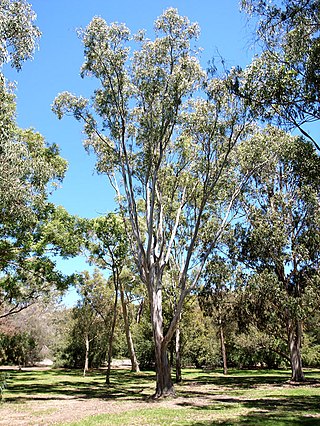
Eucalyptus amplifolia, commonly known as the cabbage gum, is a tree that is endemic to eastern Australia. It has smooth bark on its trunk and branches, lance-shaped leaves, and buds in groups of between seven and fifteen or more. The flowers are white and the fruit are woody hemispherical capsules. It is common on the coastal areas and tablelands of New South Wales and adjacent areas in south eastern Queensland, occurring as far south as Bega.

Eucalyptus mannifera, commonly known as the brittle gum or red spotted gum, is a species of small to medium-sized tree that is endemic to south-eastern Australia. It has smooth, powdery white bark, lance-shaped to curved adult leaves, flower buds in groups of seven, white flowers and cup-shaped, hemispherical or conical fruit.

Eucalyptus pachycalyx, commonly known as the shiny-barked gum, is a species of tree that is endemic to north-eastern Australia. It has smooth, pale grey, mottled bark, lance-shaped or curved adult leaves, white flowers and cup-shaped or hemispherical fruit.

Eucalyptus kessellii, commonly known as Jerdacuttup mallee, is a species of mallee that is endemic to an area along the south coast of Western Australia. It has very hard, rough bark on the trunk of larger specimens, smooth greyish and brownish bark above, lance-shaped to egg-shaped adult leaves, flower buds in groups of three or seven, creamy white flowers and downturned, conical to cup-shaped fruit.
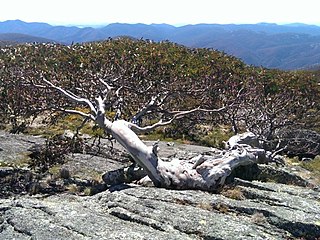
Eucalyptus pauciflora subsp. debeuzevillei, commonly known as Jounama snow gum, is a mallee or small tree that is native to a few mountain peaks in south-eastern Australia. It has smooth, shiny bark, glossy green lance-shaped to egg-shaped leaves, flower buds in groups of between nine and fifteen, white flowers and hemispherical or conical fruit. It differs from other subspecies of E. pauciflora in having angular flower buds.

Eucalyptus pauciflora subsp. niphophila, commonly known as snow gum, is a small tree or large shrub that is native to a few mountain peaks in eastern Australia. It has smooth bark, glossy green, lance-shaped to egg-shaped or elliptical leaves, flower buds in groups of between nine and fifteen, white flowers and cup-shaped, hemispherical or conical fruit. It differs from other subspecies of E. pauciflora in having more delicate, pedicellate flower buds and smaller leaves.

Eucalyptus pauciflora subsp. pauciflora, commonly known as snow gum, cabbage gum or white sally is a tree or mallee that is endemic to eastern Australia. It has smooth bark, glossy green, lance-shaped, curved or elliptical leaves, flower buds in groups of between nine and fifteen, white flowers and cup-shaped, hemispherical or conical fruit.





















